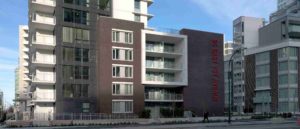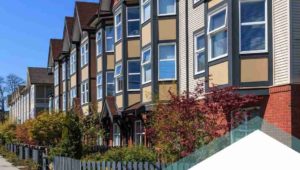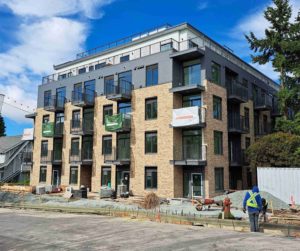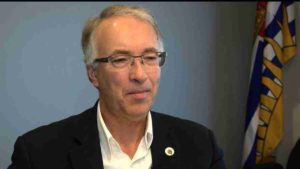
Premier David Eby and the B.C. New Democratic Party (NDP) have developed a comprehensive housing plan aimed at addressing British Columbia’s escalating affordability crisis. The second plank in the B.C. NDP’s housing plan specifically targets individuals and families earning between $30,000 and $88,000 annually, aiming to provide affordable co-operative housing on a large scale.
The B.C. New Democrats’ housing plan emphasizes the use of municipal, provincial, and federal Crown land for the construction of housing co-ops, offering long-term leases — typically on a 66-or-99 year leasehold basis — to keep costs down.

The Railyard Housing Co-operative, built on Crown land, 135-units, with bachelor-1-2-3-and-4 bedroom units, priced well below the market. Includes two child care centres, with spaces for up to 130 children.
Additionally, municipalities would forego development fees — saving up to $1.5 to $4.5 million, depending on the size of the housing co-op, and number of units — significantly reducing the cost of building, thereby allowing these newly-built housing co-op homes to remain affordable for middle-income earners.
The strategy to build co-operative housing on government land is a notable aspect of the B.C. NDP’s approach to solving the housing crisis.
Co-operative housing, which offers more stability and community engagement than traditional rental housing, is a model where residents collectively own the housing but do not own individual units.
This model has proven successful in other parts of Canada and Europe, providing long-term affordability and community-driven management.
One of the key elements of the plan is its focus on affordability through leasehold arrangements on public land.

A town house-style housing co-operative built on Crown land in Vancouver’s River District
By leasing land rather than selling it outright to developers, the government can ensure that the affordability of these homes is maintained for generations. The 66- or 99-year lease term provides security for families and individuals, allowing them to build long-term roots without the fear of skyrocketing rent or property values.

The 65-unit purpose built rental building at 2nd and Larch in Vancouver, with 14 studio, one, two and three-bedroom units set aside at CMHC’s median market rental rate, at $1000 – $1250 per month
The B.C. NDP has also introduced a provincial mandate that requires all new purpose-built rental housing to allocate 20% of units at the Canada Mortgage and Housing Corporation (CMHC) median market rental rates.
These CMHC rates are typically much lower than the market rates in hot real estate markets like Vancouver and Victoria.
By ensuring that a portion of new rental units are priced affordably, the provincial government hopes to address the growing rental affordability gap.
This is particularly significant as purpose-built rental housing often commands higher rents than older rental stock, leaving many renters — especially families — struggling to find affordable, stable homes.
In addition to building new housing, the B.C. NDP has a long-standing policy of purchasing existing apartment buildings to preserve affordable housing.
By acquiring older buildings, the government prevents private developers from converting them into luxury condos or raising rents beyond the means of current tenants. This approach has been lauded for ensuring that affordable housing remains available across municipalities, where market pressures often push lower-income residents out of desirable urban areas.
Premier David Eby has stated that the B.C. NDP will continue this strategy, helping to protect vulnerable renters from displacement due to real estate speculation.

In stark contrast, John Rustad’s B.C. Conservative Party has yet to present a comprehensive housing plan. The absence of a clear policy to address the affordability crisis leaves many wondering how the party intends to tackle one of the most pressing issues facing British Columbians.

Premier David Eby addresses a gathering of real estate and urban development professionals Thursday, Sept. 12, 2024, at the Paradox Hotel Vancouver | Photo: Rachel Thexton
Premier David Eby believes the B.C. Conservatives should release more particulars of their housing policies, with the October 19th election just over one month away.
Speaking at a meeting of real estate and urban development professionals last Thursday, the B.C. NDP leader said voters deserve to know what exactly the Conservatives intend to do on housing if they win a majority in the upcoming vote and form a new government.
“I would like to know what the Conservative housing plan is,” Eby told the audience at an industry event hosted by Urban Land Institute BC. “I think for housing to be on the ballot for people, they have to actually understand what their choices are that are coming forward.”
While Rustad has criticized the B.C. NDP for their housing initiatives, he has offered little in the way of a concrete solution. The B.C. Conservatives’ silence on this issue is particularly concerning given the housing crisis’s impact on the province’s middle- and lower-income families.
Moreover, the B.C. Conservative Party’s proposals related to rental housing would exacerbate the housing affordability problem.
Rustad’s party advocates for removing the cap on rent increases, a move that would disproportionately harm renters, particularly those on fixed or lower incomes.
Without rent control, landlords would have the freedom to increase rents at will, further straining families who already struggle to afford housing. This policy would worsen inequity in a rental market that already heavily favours landlords.
Additionally, the B.C. Conservatives have proposed further empowering landlords, potentially reducing tenant protections and making it easier for landlords to evict tenants or raise rents. This shift would create an even more unequal dynamic between landlords and tenants, where renters — many of whom are low- or middle-income families — would have little recourse against rent hikes or evictions.
Families relying on affordable rental housing would be hit hardest, with fewer options to find stable, affordable homes.
BC is leading North America in responding to the housing crisis. We’re working to bring down rents and build 300,000 middle-class homes.
John Rustad has tried to block all our actions, hand housing back to speculators, and jack up your rent. That’s a risk you can’t afford. pic.twitter.com/0lv9vyroLh
— David Eby (@Dave_Eby) September 16, 2024
— David Eby (@Dave_Eby) September 16, 2024
In contrast, Premier David Eby’s B.C. NDP housing plan aims to strike a balance between affordability and housing supply, ensuring families earning between $30,000 and $88,000 can access housing without being priced out of the market.
David Eby’s emphasis on co-operative housing, along with the mandate for affordable rental units in new developments, represents a long-term strategy to combat housing unaffordability in British Columbia. This stands in direct opposition to the B.C. Conservatives’ pro-landlord, anti-renter policies, which would likely lead to higher rents, more evictions, and an exacerbation of the housing crisis.
The contrast between the B.C. NDP and the B.C. Conservatives on housing is stark.
We’re building more homes, taking on speculators, and cracking down on standalone short-term rentals. John Rustad would cancel our plan, axing 300,000 middle-class homes. We can’t afford the risk. pic.twitter.com/RjpCigyD4v
— BC NDP (@bcndp) September 16, 2024
While the B.C. NDP have laid out a multi-faceted plan that seeks to provide affordable housing to middle-income families, protect renters, and increase housing supply, Rustad and the B.C. Conservativesoffer a vision that favours landlords, weakens tenant protections, and risks pushing more families into housing insecurity.
As the housing crisis continues to dominate the political landscape in British Columbia, voters will need to decide which approach best addresses their needs — an inclusive, affordable, multi-faceted housing strategy, or a hands-off market approach that prioritizes developers and property owners over renters.
The B.C. NDP’s Housing Plan, Part 1 — Dignified Supportive Housing
Raymond Tomlin
Raymond Tomlin is a veteran journalist and educator who has written frequently on the political realm — municipal, provincial and federal — as well as on cinema, mainstream popular culture, the arts, and technology.